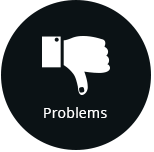
All addictions seem to fulfil the same function, i.e. to dull the emotions. The most common methods are the consumption of alcohol, nicotine, psychotropic medicines and illegal drugs such as cannabis, heroin, cocaine, MDMA, etc.
There are also behavioural addictions of an obsessive/compulsive nature, such as emotional relationships, sex, food, stress, work, shopping, gambling, etc. Addiction is at the root of the illness and all its manifestations are symptoms that can be mixed and substituted one for another. Physical and psychological dependence may follow and become irreversible if not treated.
Just stopping the consumption or the addictive behaviour does not remove the problem (the substances and the addictive behaviour are merely symptoms of the illness). The real problem which then arises is to remain abstinent in the long term after stopping. The challenge then becomes to face one’s emotions, the loss and detachment.
Addictions are often masked by one or more psychiatric problems and can overlap. The problem is to determine whether one is the cause of the other or whether there is concomitance.



